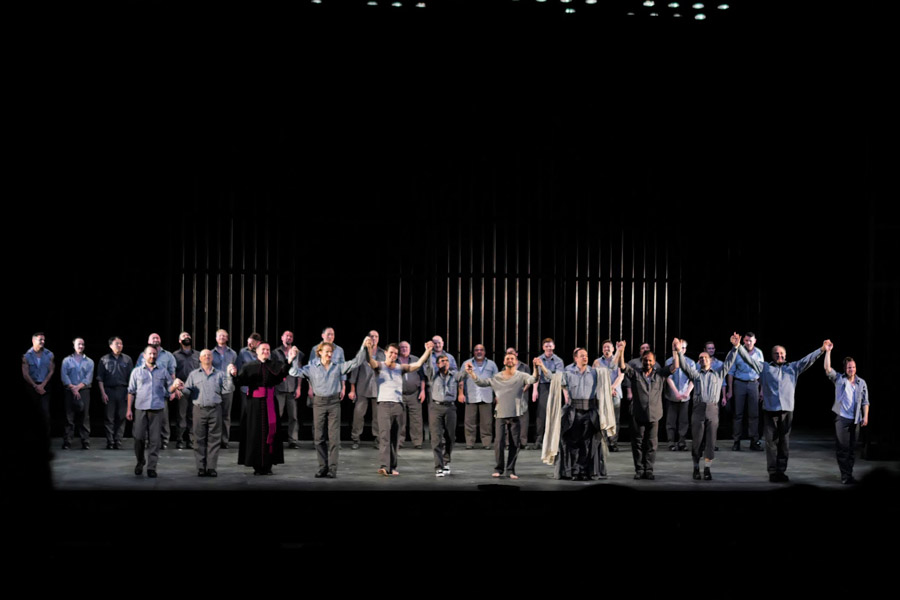Usually, when you go to see an opera, the original composer has been dead for 100 years or more. For this opera, however, the composer wasn’t just alive, he was in the house on opening night.
From Oct. 21-27, Les Feluettes – or Lilies – played at the Jubilee Auditorium to a packed house and overall positive reviews. The opening night in Edmonton marked its Alberta premiere. Kevin March, the composer, watched it in person on Tuesday the 24th when the standing ovation for his opera rang through the Jubilee.
The story of Les Feluettes is easily understood as multidimensional and captivating. When compared to other operas, its plot is rather complicated. A bishop named Bilodeau travels to a prison to hear the confession of his old friend Simon Doucet, who has been a prisoner there for 40 years. Upon the bishop’s arrival, the inmates and Simon force him to watch their depiction – in staged form – of the events that told of how the bishop was the reason Simon was imprisoned.
From there it is revealed – during the play within the play – that the bishop and Simon used to be good friends. However, Simon fell in love with another man named Vallier, which got Bishop Bilodeau fed up with jealousy because he was secretly in love with Simon. The love triangle continues and results in the incident which leads to Simon’s incarceration.
If you can’t stand the suspense and don’t know where to see the opera, you can always watch the non-operatic movie, which also received much positive critical acclaim when it was released in 1996, most notably receiving a Genie award for best picture. The Genie awards are now known as the Canadian Screen Awards.
Why did Kevin March decide to start writing the opera adaptation of the film?
“The inspiration for my opera version was the movie,” he said. “That’s how I first was introduced to the story; when I saw the movie I didn’t even know that it was a play and I didn’t know that it was in French. So my first contact with the story was the film release. … It was quite remarkable,” said March.
For nine years, he worked on the opera between other projects and during studies for his doctorate.
“And then it was in 2011 that Michel Marc got an interview with Michel Beaulac, [the artistic director and administrator for Opéra de Montréal] and found that Beaulac wanted to commission an opera based on Les Feluettes.
“So we did some test scenes and then in 2012 we signed the contract to commission and develop the opera. From that point on, the opera was no longer on the back burner, it was on the front burner,” said March.
The world premiere was held in Montréal four years later.
Tim Yakimec, the Edmonton Opera Association’s general director, explained why and how the local group prepared and performed the opera.
“There was something pure about this one, because it’s not all spectacle. It’s all on the act and the singers; there are some good actors and singers in this production and the approach is very theatrical. There’s not much spectacle but when it happens it takes your breath away,” Yakimec says.
The Edmonton Opera has been around for over 50 years – since 1963 and are celebrating their 54th season – and yet they very rarely have the opportunity to show an opera which is altogether relevant, Canadian and current.
Les Feluettes – or Lilies, if you prefer – is all those things. Yakimec explains the story of how Les Feluettes made it to the Edmonton stage for its Alberta premiere. Every year, Canadian opera companies have a convention to “deal with issues that are essential to each other. Last year, it was in Montréal.”
Right around the same time, “Opera de Montréal, together with Civic Opera Victoria had commissioned the opera Lilies, based on the Canadian play Les Feluettes, which I think is about 30 years old already, by Michel Marc Bouchard.”
As luck would have it, the opera was performed in Montréal at the very convention that Yakimec attended. “I saw it, and thought, ‘oh my gosh!’ this is so current, because of the topical issue and the brilliance in the way it was staged and conceived I thought it was really special.
“A lot of new operas are very atonal or dissonant and people have a hard time working out why the music is the way it is, so it takes a bit more work on the audience’s side before they understand it.
“With this one however, you can sit down and enjoy; it’s approachable and that’s part of the reason why I thought we needed to bring it here, because it’s new, it’s fresh, it’s topical and people will have no trouble just going into the story and letting it connect with them,” says Yakimec.
“In Edmonton, we don’t have that much opportunity to put on new works and I knew this one was worth going after.”
Here’s one last word from the composer, March: “If I had one wish for people who were coming to the opera, I think that’s what it would be: Regardless of the reasons they have for coming, they would all be able to walk away saying they’ve really had an amazing night at the opera with an amazing love story and fantastic music.”
– Bryn Lipinski





